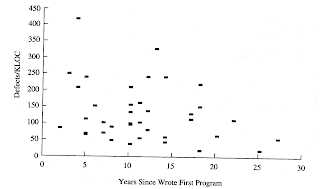Programmers seem to be fairly productive people.
You always see them typing at their desks; they chafe for meetings to finish so that they can go back to their desks and code. When asked, they will say that there is not enough time to produce the code, and the sooner they can start coding, the sooner they will be done.
So writing code must be the most important thing, correct?
If the average programmer writes about 50 lines of production code a day. A 50,000 line program would take 1,000 man days to produce. The 50,000 line listing can be entered by a programmer at about 1,000 lines a day or about 50 man days.
So what the heck are the developers doing for the other 950 days?
Before addressing that issue, lets make a simple observation. Capers Jones has compared many methodologies (RUP, XP, Agile, Waterfall, etc) and programming languages over thousands of projects and determined that programmers write between 325 and 750 lines of code (LOC) per month, which is less than the 1,000 LOC per month suggested above1. Even if programmers do not average 50 lines of code per day, the following is clear2.
- Methodology does not explain the apparent productivity gap
- No language accounts for the apparent productivity gap
The reality is that only a fraction of a developer’s time is actually spent writing production code. If a developer is typing in code all the time then they are really trying different combinations of code until they finally find the combination of code that works.
Or more correctly, the combination that seems to match the requirements until either QA or the business analyst comes back and lets them know there is a problem.
 That is why developers that plan their code before using the keyboard tend to outperform other developers. Not only do only a few developers really plan out their code before coding but also years of experience do not teach developers to learn to plan. In fact studies over 40 years show that developer productivity does not change with years of experience. (see No Experience Required!)
That is why developers that plan their code before using the keyboard tend to outperform other developers. Not only do only a few developers really plan out their code before coding but also years of experience do not teach developers to learn to plan. In fact studies over 40 years show that developer productivity does not change with years of experience. (see No Experience Required!)
Years of experience do not lead to higher productivity
Interestingly enough, there are methodologies that have been around for a long time that emphasize planning code. Watts Humphrey is the created of the Personal Software Process (PSP)3. Using PSP has been measured to:
PSP can raise productivity by 21.2% and quality by 31.2%
 If you are interested there are many other proven methods of raising code quality that are not commonly used (see Not Planning is for Losers).
If you are interested there are many other proven methods of raising code quality that are not commonly used (see Not Planning is for Losers).
If your developers at their keyboard and not planning at a white board then odds are that your productivity is not as high as it could be.
Bibliography
| 1 | The The Mythical Man Month is even more pessimistic suggesting that programmers produce 10 production lines of code per day |
| 2 | Jones, Capers and Bonsignour, Olivier. The Economics of Software Quality. Addison Wesley. 2011 |
| 3 | Watts, Humphrey. Introduction to the Personal Software Process, Addison Wesley Longman. 1997 |
Other articles in the “Loser” series
| Want to see more sacred cows get tipped? Check out: |  |
| Moo? |
Make no mistake, I am the biggest “Loser” of them all. I believe that I have made every mistake in the book at least once 🙂







